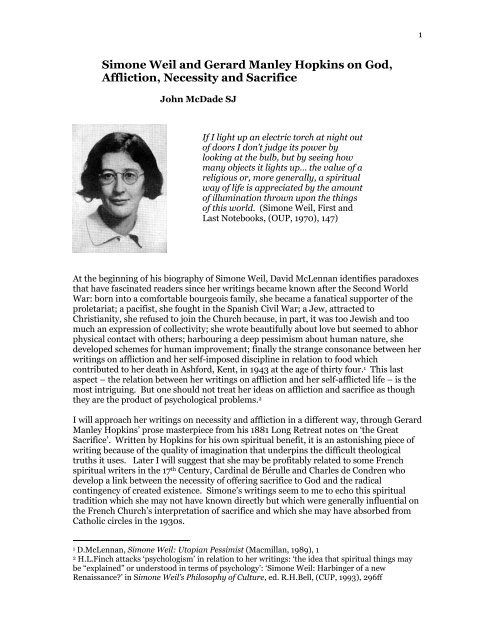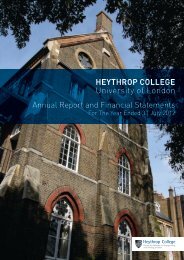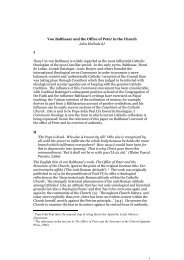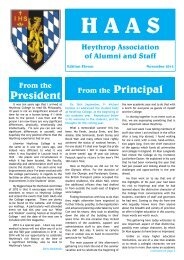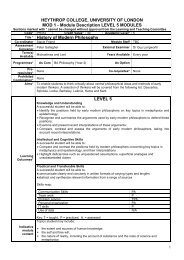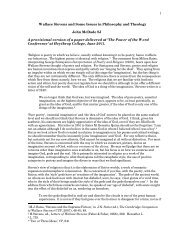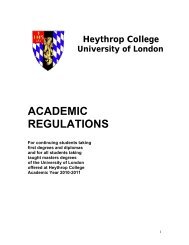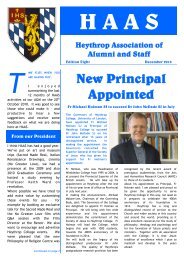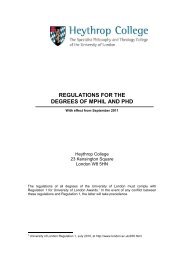Simone Weil: Affliction and Necessity
Simone Weil: Affliction and Necessity
Simone Weil: Affliction and Necessity
You also want an ePaper? Increase the reach of your titles
YUMPU automatically turns print PDFs into web optimized ePapers that Google loves.
1<strong>Simone</strong> <strong>Weil</strong> <strong>and</strong> Gerard Manley Hopkins on God,<strong>Affliction</strong>, <strong>Necessity</strong> <strong>and</strong> SacrificeJohn McDade SJIf I light up an electric torch at night outof doors I don’t judge its power bylooking at the bulb, but by seeing howmany objects it lights up… the value of areligious or, more generally, a spiritualway of life is appreciated by the amountof illumination thrown upon the thingsof this world. (<strong>Simone</strong> <strong>Weil</strong>, First <strong>and</strong>Last Notebooks, (OUP, 1970), 147)At the beginning of his biography of <strong>Simone</strong> <strong>Weil</strong>, David McLennan identifies paradoxesthat have fascinated readers since her writings became known after the Second WorldWar: born into a comfortable bourgeois family, she became a fanatical supporter of theproletariat; a pacifist, she fought in the Spanish Civil War; a Jew, attracted toChristianity, she refused to join the Church because, in part, it was too Jewish <strong>and</strong> toomuch an expression of collectivity; she wrote beautifully about love but seemed to abhorphysical contact with others; harbouring a deep pessimism about human nature, shedeveloped schemes for human improvement; finally the strange consonance between herwritings on affliction <strong>and</strong> her self-imposed discipline in relation to food whichcontributed to her death in Ashford, Kent, in 1943 at the age of thirty four. 1 This lastaspect – the relation between her writings on affliction <strong>and</strong> her self-afflicted life – is themost intriguing. But one should not treat her ideas on affliction <strong>and</strong> sacrifice as thoughthey are the product of psychological problems. 2I will approach her writings on necessity <strong>and</strong> affliction in a different way, through GerardManley Hopkins‟ prose masterpiece from his 1881 Long Retreat notes on „the GreatSacrifice‟. Written by Hopkins for his own spiritual benefit, it is an astonishing piece ofwriting because of the quality of imagination that underpins the difficult theologicaltruths it uses. Later I will suggest that she may be profitably related to some Frenchspiritual writers in the 17 th Century, Cardinal de Bérulle <strong>and</strong> Charles de Condren whodevelop a link between the necessity of offering sacrifice to God <strong>and</strong> the radicalcontingency of created existence. <strong>Simone</strong>‟s writings seem to me to echo this spiritualtradition which she may not have known directly but which were generally influential onthe French Church‟s interpretation of sacrifice <strong>and</strong> which she may have absorbed fromCatholic circles in the 1930s.1 D.McLennan, <strong>Simone</strong> <strong>Weil</strong>: Utopian Pessimist (Macmillan, 1989), 12 H.L.Finch attacks „psychologism‟ in relation to her writings: „the idea that spiritual things maybe “explained” or understood in terms of psychology‟: „<strong>Simone</strong> <strong>Weil</strong>: Harbinger of a newRenaissance?‟ in <strong>Simone</strong> <strong>Weil</strong>’s Philosophy of Culture, ed. R.H.Bell, (CUP, 1993), 296ff
2Given the importance that another great English poet George Herbert had on herthrough his poem, „Love bade me welcome‟ – it was the occasion of her becoming awareof „a presence more personal, more certain, more real than that of a human being,though inaccessible to the senses <strong>and</strong> the imagination‟ 3 – the link with Hopkins might befruitful, particularly since this particular text is redolent of themes that she will explorein her writings. It reads:The first intention then of God outside himself or, as they say, ad extra, outwards,the first outstress of God's power was Christ; <strong>and</strong> we must believe that the nextwas the Blessed Virgin. Why did the Son of God go forth from the Father not onlyin the eternal <strong>and</strong> intrinsic procession of the Trinity but also by an extrinsic <strong>and</strong>less than eternal, let us say aeonian one? To give God glory <strong>and</strong> that by sacrifice,sacrifice offered in the barren wilderness outside of God, as the children of Israelwere led into the wilderness to offer sacrifice. This sacrifice <strong>and</strong> this outwardprocession is a consequence <strong>and</strong> shadow of the procession of the Trinity, fromwhich mystery sacrifice takes its rise. But of this I do not mean to write here. Itis as if the blissful agony or stress of selving in God had forced out drops of sweator blood, which drops were the world, or as if the lights lit at the festival of the'peaceful Trinity' through some little cranny striking out lit up into being one'cleave' out of the world of possible creatures. The sacrifice would be theEucharist, <strong>and</strong> that the victim might be truly victim like, like motionless, helplessor lifeless, it must be in matter. 4It imagines an „outstress‟ that impels God ad extra, describing this as „the blissful agonyor stress of selving in God‟ -- remember that agonia means struggle. This impulseoutwards – what it is we do not know, but it is something intrinsic to God‟s act ofexistence, his „selving‟ or esse – leads to the world‟s creation („which drops were theworld‟). When Hopkins speaks of the „stress of selving in God,‟ he is, of course, speakinganalogically: just as creatures are governed by the impulse in their nature by which theyfulfil themselves, so God is subject to an intrinsic „stress‟ from within that leads outwardsto creation, sacrifice <strong>and</strong> the giving of glory in the wilderness outside God. The originalfeature here is that the creation is described in ways that evoke Gethsemane, the place ofChrist‟s agonia where drops of sweat <strong>and</strong> blood are forced out of the body of Christ as hefaces his death (Lk 22.44). We are to imagine the „blissful agony‟ by which the worldflows from the „selving‟ of God as analogous to that of Christ in Gethsemane when sweat<strong>and</strong> blood flow from him: the world is „pressed‟ from God as sweat <strong>and</strong> blood are pressedfrom the body of Christ. I know of no parallel to this astonishing suggestion which seemsto be original to Hopkins.This „outstress‟ of God issues in the related dimensions of creation, Incarnation <strong>and</strong>sacrificial atonement. The inner procession of God‟s Son is, we might say, theontological Big Bang, the foundational movement of gift <strong>and</strong> self-emptying thatculminates in the sacrifice of the Son on Golgotha, the „consequence <strong>and</strong> shadow‟ of theTrinitarian life. What unfolds in this divine expressiveness is the very actuality of Godextended <strong>and</strong> conveyed outwards in time <strong>and</strong> space as creative <strong>and</strong> redemptive self-3 Waiting for God (Perennial Classics, 2001), xxiii4 C.Devlin (ed.), The Sermons <strong>and</strong> Devotional Writings of Gerard Manley Hopkins (OxfordUniversity Press, 1959), 197; C.Phillips (ed.), The Oxford Authors: Gerard Manley Hopkins(Oxford University Press, 1986), 288-9.
3sacrificing gift. How interesting at the end of the passage is Hopkins‟ aestheticjustification (an argument from fittingness in other words) for the role of matter in thismovement outwards: what is to be offered finally to God must be a „lifeless‟ victim, <strong>and</strong>hence it must be material – clearly it is to be the dead body of the Saviour on the Cross<strong>and</strong> on the altar. 5 It also anticipates <strong>Simone</strong> <strong>Weil</strong>‟s treatment of affliction, but more ofthat later.I doubt that <strong>Simone</strong> <strong>Weil</strong> knew this text of Hopkins, but I think she would havetreasured it. As is Hopkins, <strong>Simone</strong> is alert to the inseparability of Incarnation <strong>and</strong>Atonement as intrinsic features of God‟s work of creation. She will think of theIncarnation as God‟s „chaining himself down by necessity‟. 6 She will see both creation<strong>and</strong> Incarnation not as an expansive outreach of a super-abundant God, but as a costlyrenunciation of divine power, a self-limitation in which God wills not to be everything<strong>and</strong>, so to speak, makes space <strong>and</strong> has time for things. 7Like Hopkins, she focuses on the question of how everything is, in Hopkins‟ terms, aproduct <strong>and</strong> reflection of the „outstress‟ of God. She will be clearer of course that God‟soutstress is a kenotic self-limitation, what she will call a „voluntary effacement of God‟.Where Hopkins speaks of it as a divine movement outwards to give glory through theself-sacrifice of the Son, she will present creation as a withdrawal of the divine presenceso that things can have room to be <strong>and</strong> so that the Son of God can become subject to theimpersonal ordering of the world, what she will dub „necessity‟, there to be afflicted <strong>and</strong>to love God in the condition of harsh obedience.The wilderness outside God is for her certainly barren in that it is experienced as bereftof God‟s presence. „God can only be present in creation under the form of absence,‟ shesays. 8 God‟s act of withdrawal so that the world can exist is simultaneously arelinquishing of divine control <strong>and</strong> a h<strong>and</strong>ing over of events to an impersonal chain ofnecessity as the systems of the world run themselves. Some years ago, one of thecartoonists in The Guardian said that his aim was „to have a lifestyle in which hispersonal presence wasn‟t required‟: one sometimes feels that <strong>Simone</strong> portrays God insimilar terms, active, but not fully present to the reality that depends on him. She speaksat times as though God‟s personal presence in relation to the creation has been replacedby ordering principles that are objective expressions of divine goodness, but which arethe sole active agents in relation to us, pressing us to abnegation. This absence of Godfrom the ordering of the world is not disastrous, she insists:5 Cf. Han Urs von Balthasar‟s reference to Christ‟s „corpse obedience‟ in A von Balthasar Reader,ed. W. Löser & M. Kehl (T.& T.Clark,1982), 153. The background is the Franciscan spiritualtradition which advises that the friar should be so devoid of self-will <strong>and</strong> subject only to the will ofhis superior that he can be compared to a corpse completely dead to self.6 „God turns himself into necessity….Creation: God chaining himself down by necessity…Everything that I suffer, God suffers it too, for that is the effect produced by necessity, the freeplay of which he refrains from violating.‟ (Notebooks I, 190-1)7 „Because he is the creator, God is not all powerful. Creation is abdication…. God has emptiedhimself. This means that both the Creation <strong>and</strong> the Incarnation are included in the Passion.‟(FLN 120)8 Gravity <strong>and</strong> Grace (Routledge, 2004), 109
4God‟s absence is the most marvellous testimony of perfect love, <strong>and</strong> that is whypure necessity, the necessity which is manifestly so different from good, is sobeautiful. 9It is because of God‟s absence, what she also refers to as God‟s „secret presence‟, thatthere can be what she calls „an unconsoled affliction which is necessary‟. 10 „A time has tobe gone through,‟ she says, „that is without any reward, natural or supernatural.‟ 11She engages this question of God‟s absence in ways that are dramatic, rhetorical,paradoxical <strong>and</strong> even, one sometimes suspects, in ways that are simply wrong <strong>and</strong>misguided. For example, she offers a grim list of some of the consequences of „purenecessity‟ that governs the world <strong>and</strong> then explains that this necessity is a screen thatprotects us from full exposure to God:Relentless necessity, misery, distress, the crushing burden of poverty <strong>and</strong> ofexhausting labour, cruelty, torture, violent death, constraint, terror, disease – allthis is but the divine love. It is God who out of love withdraws from us so that wecan love him. For if we were exposed to the direct radiance of his love, withoutthe protection of space, of time <strong>and</strong> of matter, we should be evaporated like waterin the sun…<strong>Necessity</strong> is the screen placed between God <strong>and</strong> us so that we can be.It is for us to pierce through the screen so that we cease to be. 12Is the list of things in the first sentence really to be attributed to „divine love‟? Yes, says<strong>Simone</strong>: they arise because the features of the world are both an expression of divinegoodness <strong>and</strong> beauty <strong>and</strong> also a context that breaks <strong>and</strong> dissolves human beings. Both ofthese things are true. She describes necessity as „the obedience of matter to God,‟ „anorder whereby each thing, being in its place, permits all other things to exist‟; necessity is„for matter the intersection of obedience to God <strong>and</strong> of the brute force which subduescreatures‟, exercising an ordered constraint on what happens in the world. The worldhas an irreducible structure which expresses not only beauty <strong>and</strong> order <strong>and</strong> goodness,but also justice: necessity, she says, is „the principle of coexistence… <strong>and</strong> basically thesupreme justice for us is acceptance of the coexistence with ourselves of all creatures <strong>and</strong>all things which make up the existent.‟ This is why she commends that we „consentimpartially to the existence of all that exists‟, recognising that God‟s light „shinesimpartially on all beings <strong>and</strong> things‟. 13 She even counsels „loving‟ the impersonalnecessity that afflicts us:One must tenderly love the harshness of that necessity which is like a coin withtwo faces, the one turned towards us being domination <strong>and</strong> the one turnedtowards God, obedience. We must embrace it closely even if it offers its roughestsurface <strong>and</strong> the roughness cuts into us. Any lover is glad to clasp tightly some9 Notebooks, II, (Routledge & Kegan Paul, 1976), 40210Gravity <strong>and</strong> Grace, (Routledge Classics, 2002),12. Cf Franz Kafka: „In a certain sense, theGood is comfortless.‟ (Blue Octavo Notebooks (Exact Exchange, 1991), 24)11 Gravity <strong>and</strong> Grace, 1112Gravity <strong>and</strong> Grace, 32-3. But exposure „to the direct radiance of God‟s love‟ is what we mean byresurrection <strong>and</strong> it is not evaporation but consummated union.13 Intimations of Christianity among the Ancient Greeks (Ark, 1987), 180ff. How she regardsnecessity is fully explored in D.Allen & E.O.Springsted, Spirit, Nature <strong>and</strong> Community: Issues inthe Thought of <strong>Simone</strong> <strong>Weil</strong> (State University of New York Press, 1994), 33-52
5object belonging to an absent loved one, even to the point where it cuts into theflesh. We know that this universe is an object belonging to God. We ought tothank God from the depth of our heart for giving us necessity, his mindless,sightless <strong>and</strong> perfectly obedient slave, as absolute sovereign… We are the slavesof necessity, but we are also the sons of her Master. 14This wonderful necessity, so impersonal <strong>and</strong> complex, is willed by God in its own right,<strong>and</strong> our human identity is set in this ordered cosmos in such a way that within it we willbe decreated, decentred, made nothing, be afflicted, bodily undone <strong>and</strong> spiritually freed.15Time in the end brings dissolution <strong>and</strong> it is intended to do so: <strong>Simone</strong> looks at this witha cold eye. „There can be no answer,‟ she says, to the „why?‟ of the afflicted because theworld is necessity <strong>and</strong> not purpose... whenever we look for final causes in this world itrefuses them.‟ 16 Or rather, there is a purpose but it can only be understood in relationto Christ‟s subjection to necessity:The absolute domination throughout the whole universe of a mechanical,mathematical, absolutely deaf <strong>and</strong> blind necessity is unintelligible unless onebelieves that the whole universe, in the totality of space <strong>and</strong> time, has beencreated as the Cross of Christ. 17For her, God does more than permit this kind of world, but rather wills it as an objectiveexpression of his goodness; God incarnates in the world, <strong>Simone</strong> suggests, the divineattribute of beauty, but its very structure presses on us <strong>and</strong> afflicts us in a purposelessway. What happens to us is without purpose – it is, she suggests, r<strong>and</strong>om <strong>and</strong>impersonal – but we can charge that emptiness with meaning by accepting <strong>and</strong> lovingthe absent God in it, <strong>and</strong> indeed that is our flourishing. The „other who will take uswhere we would rather not go‟ (Jesus‟ words to Peter in Jn 21.18) is God <strong>and</strong> the cordthat leads us is the necessity that structures the order of the world. As Samuel Becketputs in so sharply <strong>and</strong> in such a natural Irish colloquialism: „Birth was the death of him.‟That is the necessity that governs us, <strong>Simone</strong> says at one time „in place of God‟, atanother, that this is simply how God governs <strong>and</strong> presses us outwards. God‟s providencebreaks us, <strong>and</strong> that will be for our good. Pointedly she says that „suffering has nosignificance. There lies the very essence of its reality. We must love it in its reality whichis absence of significance. Otherwise we do not love God.‟ 18 And in a note to herself, shewrites: „I must not love my suffering because it is useful, but because it is.‟ 19 Just as weare to be good for nothing, so we are to suffer for nothing.Here I‟m tempted to return to Hopkins‟ image <strong>and</strong> say that, mirroring what takes placein God, the „stress of selving‟ in us who are subject to necessity forces out drops of sweator blood, which drops are the genuine self, freed from our imagined place at the centre of14 On Science, <strong>Necessity</strong> <strong>and</strong> the Love of God (OUP, 1968), 18615 Pascal may be an influence on how <strong>Simone</strong> views necessity <strong>and</strong> God: „If God gave us masterswith his own h<strong>and</strong>, how gladly we ought to obey them. <strong>Necessity</strong> <strong>and</strong> events are infallibly such.‟(Pensées S751‟ L919). (Si Dieu nous donnait des maîtres de sa main, ô qu’il leur faudrait obéirde bon cœur. La nécessité et les événements en sont infalliblement.’)16On Science, <strong>Necessity</strong> <strong>and</strong> the Love of God (OUP, 1968), 197)17 Intimations of Christianity among the Ancient Greeks (Ark, 1987), 19818 Notebooks II, 483-419 Notebooks II, 434
6all things. She is in no doubt that we spontaneously place ourselves at the centre of theworld <strong>and</strong> are aggrieved that it does not owe us a living; this needs adjustment:To empty ourselves of our false divinity, to deny ourselves, to give up being thecentre of the world in imagination, to discern that all points in the world areequally centres <strong>and</strong> that the true centre is outside the world, is to consent to therule of mechanical necessity in matter <strong>and</strong> of free choice at the centre of eachsoul. 20In pursuing this line, does <strong>Simone</strong> fall at times into deism? Yes, clearly, but you mustrealise what she is doing. When reading <strong>Simone</strong> <strong>Weil</strong>, you discover that there aremultiple, apparently contradictory, certainly r<strong>and</strong>om or at least incompatible ways ofthinking of a particular thing, <strong>and</strong> we need to remember one of the principles she setsdown about how to think: „We must welcome all opinions but they must be arrangedvertically <strong>and</strong> kept on suitable levels.‟ 21 Different opinions are, as it were, stacked on topof one another in the one place so that we do not have to choose between them. Theyhave their place in the complex of necessary statements that we need to make. Thisr<strong>and</strong>om flurry of thoughts is one of the reasons why one keeps reading her. But unlikePascal, her pensées are not crafted in advance of their being written; the aphoristic stylepersists even in her essays. We should remember the principle she enunciates: „Methodof investigation: as soon as we have thought something, try to see in what way thecontrary is true‟. 22 By ignoring this, we can sometimes make her more systematic <strong>and</strong>poised than she really was. She is really a more tentative thinker than her commentatorsoften recognise.If <strong>Simone</strong> <strong>Weil</strong> speaks at times as though the order of the world, so worthy of reverencefor its coherent complexity <strong>and</strong> beauty, is positively willed by God to purify us, on a verydifferent track she suggests that the human analogue for God creating the world is notthat of a person making something, but what happens when human beings perform actsof charity. This is a very fruitful approach. „The mystery of creation,‟ she says, „finds itsanalogy in us in the mystery of charity passing into acts.‟ 23 In other words, if you want toknow what creation is, then live <strong>and</strong> act out of the charity of the suffering Servant – thenyou‟ll get a feeling for what it is for God to create. By acting within the dem<strong>and</strong>s ofcharity, <strong>and</strong> paying the price of genuine loving, you will come to experience the religioustruth that God‟s work of creation flows seamlessly into the difficult task of loving aresistant world. Terry Eagleton puts it strikingly: „Eternity lies not in a grain of s<strong>and</strong> butin a glass of water. The cosmos revolves on comforting the sick. When you act in thisway, you are sharing in the love which built the stars. To live in this way is not just tohave life, but to have it in abundance.‟‟ 2420 Waiting for God (Perennial Classics, 2001), 10021 Quoted in Gravity <strong>and</strong> Grace, xix.22 Gravity <strong>and</strong> Grace, 102. Cf. David McLennan‟s comment: <strong>Weil</strong> purposely used contradictionas a method for transcending a particular <strong>and</strong> limited perspective for (as she put it) “emergingfrom a point of view” (Notebooks I, 46).‟ (<strong>Simone</strong> <strong>Weil</strong>: Utopian Pessimist (Macmillan, 1989),197)23 Notebooks 1, 30024 Terry Eagleton, The Meaning of Life (OUP, 2007), 164-5
7But <strong>Simone</strong>‟s more common <strong>and</strong> brittle vision is that God abdicates governance of theworld, or rather h<strong>and</strong>s it over to two forces: the gravity that governs matter <strong>and</strong> humanfreedom which exists in varying degrees:God causes this universe to exist, but he consents not to comm<strong>and</strong> it, although hehas the power to do so. Instead he leaves two other forces to rule in his place. Onthe one h<strong>and</strong> there is the blind necessity attaching to matter, including thepsychic matter of the soul, <strong>and</strong> on the other the autonomy essential to thinkingpersons.‟ 25God wills to h<strong>and</strong> us over to an order that is intended to decreate <strong>and</strong> decentre us. Youwill remember that Augustine sought a mythical but no less real connection between thesin of Adam <strong>and</strong> our burden of suffering <strong>and</strong> mortality, <strong>and</strong> it did so in order to convictus <strong>and</strong> not God of responsibility for the state of things. <strong>Simone</strong> seems to placeresponsibility on God who not only permits but wills the wine-press of our existence.Now these aspects are troubling because they focus on issues of how necessity <strong>and</strong>r<strong>and</strong>om events cohere with a doctrine of God‟s providential care.Reading her makes one doubt if one can successfully sustain a clear distinction betweenGod permitting <strong>and</strong> God willing which is often thought to carry weight. You willremember the moment in Into Great Silence, the film about La Gr<strong>and</strong>e Chartreuse, whenan elderly blind monk said that God wanted him to be blind <strong>and</strong> to love him in thisaffliction. This could only be said by the man himself, of course, but one should listen tosomeone who is brought to a deep acceptance of affliction <strong>and</strong> to the spiritual truth thatthis affliction enables a deeper love of God because this might be a testimony to grace. IfHopkins is right in saying that everything springs from the desire of the Son to give aglory to God that extends into the physicality of matter, then the world is simply amovement Into Great Sacrifice in which „the blind necessity attaching to matter‟ <strong>and</strong> thecorresponding decreation of the self are how the world is drawn into giving glory to God.We, <strong>and</strong> everything else, are in „deep God‟, moments in the trajectory of the Son of Godgiving glory to the Father in the barren wilderness. That may be what one aspect of whatwe mean by saying that we, <strong>and</strong> the whole creation, are „in Christ‟.Referring to the myth of the Cave in Plato‟s Republic, which she finds much more usefulthan the Genesis story of Adam <strong>and</strong> Eve for speaking about our condition, shecomments, „Idolatry is a vital necessity in the cave‟. Given this kind of world, we shouldnot be surprised by the prevalence of idolatry; at the same time, we should be consoledthat there can be transformative but still implicit forms in which God is loved, throughneighbour, beauty <strong>and</strong> religious rites. 26 She even goes so far as to judge the truth ofreligion by the quality of its grasp of God‟s self-limitation:The religions which have a conception of this renunciation, this voluntarydistance, this voluntary effacement of God, his apparent absence <strong>and</strong> his secretpresence here below, these religions are true religion, the translation intodifferent languages of the great Revelation. The religions which representdivinity as comm<strong>and</strong>ing wherever it has the power to do so are false. Eventhough they are monotheistic they are idolatrous. 2725 Waiting for God (Perennial Classics, 2001), 99-26 She would have understood Kafka‟s remark: „Not everyone can see the truth, but he can be it.‟(Blue Octavo Notebooks (Exact Exchange, 1991), 31)27„Forms of the Implicit Love of God‟, in Waiting for God, 88
8To worship a comm<strong>and</strong>ing sovereign God, the cosmic tyrant, or conversely to reject sucha God in the spirit of Ivan Karamazov, is to construct a metaphysical idol in place of thereal God.No one goes to God the creator <strong>and</strong> almighty without passing through GodEMPTIED OF HIS DIVINITY. If one goes to God directly, it is then Jehovah (orAllah, the one in the Koran). We have to empty God of his divinity in order tolove him. He emptied himself of his divinity by becoming man, then [emptiedhimself] of his humanity by becoming a corpse (bread <strong>and</strong> wine), matter…. Torebel against God because of man‟s affliction, after the manner of Vigny or IvanKaramazov, is to represent God to oneself as a sovereign.‟ 28To treat God as a despot running a brutal cosmos is wrong because the whole process ofuprooting of self <strong>and</strong> subjection to necessity begins with the movement of love <strong>and</strong> giftthat God is. Nehemiah Polen, writing about the Hasidic Rabbi Kalonymous Shapira whodied in the Warsaw Ghetto, says that in the Hasidic tradition, „acceptance of what is‟ is ahigh point of spiritual attainment. In the context of the Warsaw Ghetto, surely a terribleplace in which to learn <strong>and</strong> practice this virtue, Rabbi Shapira may have exemplified it. 29Read that phrase, „acceptance of what is‟ in a Thomist way, as „acceptance of esse‟, <strong>and</strong>read it in the light of the themes that we have been exploring in <strong>Simone</strong> <strong>Weil</strong>‟s writings,<strong>and</strong> we can say that she is centrally concerned about how we are to accept the self-givingesse that is God by extinguishing the false esse of our imagined lives <strong>and</strong> our idols.What <strong>Simone</strong> will call „decreation‟, how we pass from self-directed life into the uncreatedwithout illusions or self-generated fantasy about the self, corresponds to what God is, thefoundational movement of self-relinquishing love. 30 As well as being a „nothing thoughtby God,‟ <strong>Simone</strong> says, „We are a part that has to imitate the whole,‟ <strong>and</strong> the whole (Godpresumably) is the foundational movement of self-emptying in which we exist. 31 Hervocabulary seems to evoke the very striking rhetoric of Cardinal de Bérulle, the greatfounder of the French Oratory in 17 th Century Paris who was under no illusions about thestability or character of the self that is entirely dependent on God, to the point that he sawthe person as a „nothing tending towards nothingness‟. But let the great Cardinal speakfor himself:„Nous sommes un néant qui tend au néant, qui cherche le néant, qui s‟occupe dunéant, qui se contente du néant, qui se remplit de néant, et qui enfin, se ruine <strong>and</strong>se détruit soi-même pour un néant, au lieu que nous devons être un néant, a lavérité (car cela nous convient par nature), mais un néant en la main de Dieu, un28 Notebooks, I, 28329 N.Polen, The Holy Fire: The Teachings of Rabbi Kalonymous Kalman Shapira, the Rebbe ofthe Warsaw Ghetto (Jason Aronson Inc, 1994). „It was left then for Rabbi Shapira to simplyaffirm, as a matter of faith that what was taking place was “how it should be”. Under thecircumstances, such an affirmation necessitated an abrogation of independent critical judgement,an act of “mental martyrdom” akin to the mystic‟s self-surrender of his very being to God.‟ (92-3)Polen points out that this is only one aspect of Shapira‟s response to the Shoah.30 „In a sense God renounces being everything. We should renounce being something. That is ouronly good.‟ (Gravity <strong>and</strong> Grace, 33)31 Gravity <strong>and</strong> Grace, 140
9néant destiné à Dieu, un néant référé à Dieu, un néant choisi de Dieu, un néantconsacré à Dieu, un néant rempli de Dieu, en enfin un néant possédé de Dieu etpossédant Dieu ; et cela nous convient par grâce. ‟ 32(„We are a nothing that tends towards nothing, which seeks nothing, which isconcerned with nothing, which is content with nothing, which fills itself withnothing, <strong>and</strong> which in the end ruins <strong>and</strong> destroys itself for nothing, whereas weought to be in truth (for that is appropriate to us by nature) a nothing in theh<strong>and</strong> of God, a nothing destined for God, a nothing referred to God, a nothingchosen by God, a nothing consecrated to God, a nothing filled with God <strong>and</strong>finally a nothing possessed by God <strong>and</strong> possessing God; <strong>and</strong> that is appropriateto us by grace.’)What did congregations of devout <strong>and</strong> not so devout religious in Paris make of thisintensely metaphysical rhetoric? They may well have drawn an ontological frisson fromthis discourse, but one wonders if ideas like this were of much practical or spiritual help tothem. The atheistic Jean-Paul Sartre <strong>and</strong> the religious <strong>Simone</strong> <strong>Weil</strong>, however, would havewell understood what Bérulle meant about the abyss over which we live our lives. <strong>Simone</strong>relates our vacuity to the Incarnation: „To teach us that we are non-being (non-être), Godmade himself into non-being‟. 33 Of course there are other <strong>and</strong> better reasons for theIncarnation than to convey this metaphysical lesson, but the point is not withoutsignificance. Engagement with radical contingency is both part of our human condition<strong>and</strong> what God assumes into the divine existence.Abnegation <strong>and</strong> the extinction of self, the moral <strong>and</strong> spiritual acceptance of what is <strong>and</strong>the costly direction of the self towards God are central features of how we come to God.Love, after all, for her is direction, movement, attentiveness, waiting, not a state of soul.God is not reached by an expansion of the self: that only leads to circle-dancing <strong>and</strong> treehugging.She would have understood the constraints contained in Kafka‟s aphorism:„Two tasks at the beginning of your life: to keep reducing your circle, <strong>and</strong> to keep makingsure you‟re not hiding somewhere outside it‟. 34 She thinks that God is reached throughthe chipping away of the self, through a rétrécissement, a shrinking or contraction of thecircle of the self by which we come to our core identity, freed from the rat-runs of theself-serving psyche. She explores in a circuitous <strong>and</strong> sometimes contradictory way howa self-sacrificing God creates a world wonderfully obedient to the necessity that governsit <strong>and</strong>, how within it human beings are brought into the movement of kenosis that„moves the heavens <strong>and</strong> the other stars‟. J.P.Little‟s comment is perceptive:It is to the initial act of creation that decreation is a response. I am, says <strong>Simone</strong><strong>Weil</strong>, God‟s abdication, <strong>and</strong> the more I insist on being, the more God abdicates.To allow the full existence of God once more, it is therefore necessary for me toreproduce God‟s initial act of abdication, by refusing to be, <strong>and</strong> by destroying apart of myself.‟ 3532 Bérulle, Œuvres complètes, (Oratoire de France et Editions du Cerf (1995) I, 4, 98. Cf.Opuscules de Piété 1644, ed. M.Vetö (Jerome Millon, 1997), 26 ; V. Carraud, „De l‟état de néant àl‟état anéanti : Bérulle‟ in Pascal : des connaissances naturelles à l’étude de l’homme (Vrin,2007), 129-6233 Quoted in Gravity <strong>and</strong> Grace, xxviii34 Franz Kafka, The Zürau Aphorisms (Harvill Secker, 2006), 9335 „<strong>Simone</strong> <strong>Weil</strong>‟s Concept of Decreation‟ in <strong>Simone</strong> <strong>Weil</strong>’s Philosophy of Culture, ed. R.H.Bell,(CUP, 1993), 27
10We began with a passage from Gerard Manley Hopkins <strong>and</strong> we should go back to it <strong>and</strong>attend particularly to the final sentence because for both Hopkins <strong>and</strong> <strong>Simone</strong> thesacrificial offering of the Son is the only key to the meaning of the world under God:without Christ, it makes no sense. We read again from Hopkins:The sacrifice would be the Eucharist, <strong>and</strong> that the victim might be truly victimlike, like motionless, helpless or lifeless, it must be in matter.‟In Hopkins‟ account, the climax of the movement Into Great Sacrifice is the religiousritual of offering bread <strong>and</strong> wine which have become the body <strong>and</strong> blood of Christ. Thereis, Hopkins suggests, a particular fittingness in the inert quality of what is taken into theGreat Sacrifice, namely matter that is subject, in <strong>Simone</strong>‟s term, to pesanteur, gravity,<strong>and</strong> is opaque to life <strong>and</strong> movement. The Eucharist extends Christ‟s sacrifice to all ofhumanity through the medium of two lifeless material realities: unleavened bread <strong>and</strong>acrid wine which become irradiated with the divine presence. Presumably too forHopkins, the inert quality of the Eucharistic elements evoke the condition of the deadbody of Christ on the Cross, his status as lifeless victim in matter.It can be difficult to underst<strong>and</strong> Hopkins‟ emphasis on this final point in his account isthat we have forgotten the significance that the theme of sacrificial victimhood had inEucharistic theology. Again, the 17 th Century French spiritual writers are the referencepoint because they bequeathed to the Church a profound analysis of sacrifice in relationto Eucharistic <strong>and</strong> ascetic theology. 36 If we assume that the main lines of this traditioncame through to Hopkins, we will not be far wrong: this French teaching shaped allEucharistic teaching up to Vatican II when the emphasis on the Eucharist as sacred mealdrew attention away from that of the Eucharist as ritual sacrifice. The three great writerson sacrifice in this period were Cardinal de Bérulle, Charles de Condren, the co-founderwith Bérulle of the Oratory in Paris <strong>and</strong> Jean-Jacques Olier, the founder of the seminaryof Saint-Sulpice. Condren has the most fully developed analysis of sacrifice. 37 Asummary of his teaching will introduce him here:At the heart of Condren‟s spirituality was a strong consciousness of the fact ofcreation <strong>and</strong> the nothingness of man the creature, who is wholly dependent onGod. This led to a great devotion to the Word Incarnate, the supreme priest <strong>and</strong>perfect victim, who in a state of interior annihilation <strong>and</strong> total immolation offeredto God the only sacrifice worthy of the Creator. 38Condren had such a reputation for sanctity (St Vincent de Paul said he was without peer)that when Bérulle passed his door he „would throw himself on the ground to kiss theplace where so holy a priest had trod‟. 39 His teachings come to us through his disciplePère Amelote who recounts Condren‟s inaugural religious experience as a twelve year oldboy:36 J.Galy, Le sacrifice dans l’école francaise de spiritualité (Paris: Nouvelles Editions Latines,1951)37 H.Bremond, A Literary History of Religious Thought in France, III (SPCK, 1936), 298:„Bérulle‟s theocentrism spontaneously directs itself towards lyrical adoration, that of Condrentowards the sacrifice of adoration.‟38 New Catholic Encyclopedia (Catholic University of America Press, 2003 ), vol 4, 7439 Bremond, 250
11when studying one day was suddenly aware of his mind being encompassed witha wonderful light, in the radiance of which the divine Majesty appeared to him soimmense <strong>and</strong> so infinite that it seemed to him that this One Pure Being aloneought to subsist, <strong>and</strong> that all the universe should be destroyed for his Glory. Hesaw that God had no need of any creature; that his own Son, in whom was all hisgood pleasure, had of necessity offered up his life to him; that only thedisposition of offering up himself <strong>and</strong> all things in Jesus the victim was worthy ofhis greatness, <strong>and</strong> that it was not enough to love him, if one were not ready, withhis Son, to lose oneself for love of him….He felt strongly drawn to that mode of life which is a complete dying to things ofthe present, <strong>and</strong> a clinging to none but Jesus Christ; <strong>and</strong> so great was the powerof this divine light on him that he could have wished to be instantly immolated tothe Majesty that filled his spirit.For being in the abyss of his nothingness before the divine holiness <strong>and</strong> desiringardently to be sacrificed for his glory, he was suddenly filled with a particular joyin seeing that the Son of God was ever the victim of the Father…. He recognisedthat the sacrifice of Jesus Christ was the fulfilling of the zeal of all whothemselves desired their immolation, but who were incapable worthily ofhonouring God by their sacrifice. That to present to the Father the Son who died,was to praise in infinity the divine holiness, justice, all-sufficiency, <strong>and</strong> in a wordhis whole infinity, acknowledging before the Father eternal that not only theuniverse but he himself merited destruction before him; <strong>and</strong> he saw that only theunique sacrifice of Jesus Christ was worthy of God. 40This remarkable experience is very revealing in the bond it makes between radicalmetaphysical contingency (God alone is) <strong>and</strong> the necessity (fittingness?) of an act ofsacrificial atonement (all creation must find its destiny in being immolated with Christ):ontology <strong>and</strong> atonement meet <strong>and</strong> embrace, one might say. 41 As with the passage fromHopkins, <strong>Simone</strong> would probably have treasured this text because it reverberates withsome of her characteristic themes: a fragile <strong>and</strong> contingent creation vacant of purpose;the impulse to offer oneself to the holiness of God who alone is; the role of Christ ingiving glory to God through being a victim; joy in seeing that total sacrifice is how webreak through to the actuality <strong>and</strong> full presence of God. Did <strong>Simone</strong> draw upontraditions like these? Surely she did; the parallels are unlikely to be accidental. 42Earlier we saw that she speaks of „the blind necessity attaching to matter, including thepsychic matter of the soul,‟ <strong>and</strong> that she identifies the Son‟s entry into „matter‟ as thenadir of divine self-emptying. Analogously, she thinks that through labour „man turnshimself into matter, as Christ does through the Eucharist. Work is like a death.‟ 43 TheEucharistic parallel is clear:40 Bremond, 294-541 This account has almost certainly been amplified by the adult Condren in the light of his laterspiritual teachings. But that an intelligent <strong>and</strong> devout twelve year old, endowed with sensitivityto spiritual matters <strong>and</strong> exposed to a catechesis about the creation‟s contingency <strong>and</strong> a sacrificialaccount of the Eucharist, should feel things in this way is certainly conceivable.42 J.P.Little relates her to Jean-Pierre de Caussade‟s writings on self-ab<strong>and</strong>onment: „<strong>Simone</strong><strong>Weil</strong>‟s Concept of Decreation‟ in <strong>Simone</strong> <strong>Weil</strong>’s Philosophy of Culture, ed. R.H.Bell, (CUP, 1993),49-51. There has, however, been little attention to her deployment of the spirituality of sacrifice.43 Gravity <strong>and</strong> Grace, 181
12Catholic communion. God did not only make himself flesh for us once, every dayhe makes himself matter in order to give himself to man <strong>and</strong> to be consumed byhim. Reciprocally, by fatigue, affliction <strong>and</strong> death, man is made matter <strong>and</strong> isconsumed by God. 44It is significant, she suggests, that God, though the death of the Son <strong>and</strong> his Eucharisticpresence, „becomes matter‟ <strong>and</strong> that humans too, through affliction <strong>and</strong> death alsobecome matter. 45 Both are matter-bound, we might say. She relates the theme ofhumans being „made matter‟ <strong>and</strong> the way humans make themselves resistant to God,drawing a parallel between the opacity of matter subject to physical constraints <strong>and</strong> laws<strong>and</strong> the dense resistance of those who, although endowed with freedom, do not love God.If we do not become obedient to God, we become not disobedient, but „subject tomechanical necessity‟. 46 When a person turns away from God, she says, he gives himselfup to „the law of gravity‟:Then he thinks that he can decide <strong>and</strong> choose, but he is only a thing, a stone thatfalls. If we examine human society <strong>and</strong> souls closely <strong>and</strong> with real attention, wesee that wherever the virtue of supernatural light is absent, everything is obedientto mechanical laws as blind <strong>and</strong> exact as the laws of gravity. To know this isprofitable <strong>and</strong> necessary. Those whom we call criminals are only tiles blown off aroof by the wind <strong>and</strong> falling at r<strong>and</strong>om. Their only choice is the initial choice bywhich they became such tiles. 47She judges that criminals, especially the „worst criminals‟ in their graceless inertia, areimmersed in the obedience of matter to God <strong>and</strong> so, they, even they, obey God. Shereaches the view – <strong>and</strong> one suspects that she delights in the intellectual playfulness ofthis very serious theme – that those who do not love God are unexpectedly obedient toGod because by their choice, they do not cease to be obedient to God, but becomeobedient to God differently, in ways consistent with the obedience of matter‟s „compact<strong>and</strong> dark mass‟:God has created – that is to say not that he has produced something outsidehimself, but that he has withdrawn, permitting a part of being to be other thanGod. To this divine renunciation corresponds the renunciation of creation, that isto say, obedience. The whole universe is nothing but a compact mass ofobedience. This compact mass is scattered with luminous points. Each one ofthese points is the supernatural part of the soul of a rational creature who lovesGod <strong>and</strong> who consents to obey. The rest of the soul is caught in the compactmass. The beings endowed with reason who don‟t love God are only thefragments of the compact <strong>and</strong> dark mass. They too are completely „obedience‟,but only in the manner of a falling stone. Their soul too is matter, psychic matter,subject to a mechanism as rigorous as that of gravity (pesanteur). Even theirbelief in their own free will, the illusions about their pride, their threats, theirrevolts – all that simply constitutes phenomena as rigorously determined as therefraction of light. Considered in this way, as inert matter, the worst criminals44 Gravity <strong>and</strong> Grace, 3445 Here we might want to correct her Eucharistic theology: it is not that God or Christ „becomesmatter‟, but that matter becomes the presence of Christ in the order of signs.46 On Science, <strong>Necessity</strong> <strong>and</strong> the Love of God (OUP, 1968), 17847 Waiting for God, 75
15On the connection between Hopkins <strong>and</strong> Condren: Joe Fenney writes:In Norman MacKenzie's definitive edition of the GMHpoems (Clarendon P, 1990), he prints GMH's translation "To Jesus living inMary: a prayer by Fr. Condren..." on p. 103 (poem # 90), <strong>and</strong> adds muchinformation in his notes (pp. 300-01), e.g., that GMH likely began the poemwhen he was teaching at Newman's Oratory School (1867-68) <strong>and</strong> thatCondren's collected works had recently been edited <strong>and</strong> published by L.M.Pin (Paris, 1857-8) who had also done a biography of Condren (1855).


